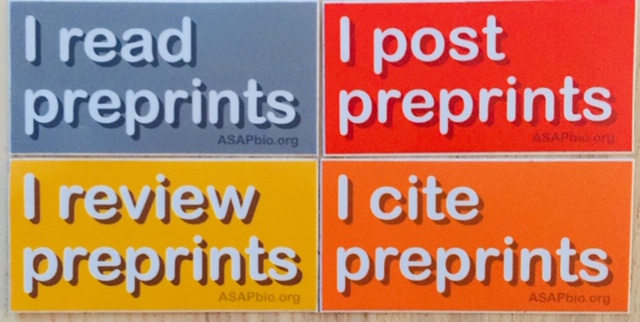Preprints in Biology and Medicine
ASAPbio Workshop and Roadmap
Preprint services have been getting a lot of attention recently. Last year saw a comprehensive review of the landscape by the Knowledge Exchange, two discussions at the Charleston Conference (why preprints, Hyde Park Debate), and a two-day preprints event organized by NISO. On January 20-21, the new decade opened with a preprints roadmap workshop spearheaded by ASAPbio in collaboration with the European Bioinformatics Institute (EMBL-EBI) and Ithaka S+R. ASAPbio (Accelerating Science and Publication in Biology) is a scientist-driven non-profit organization with a mission to promote transparency and innovation in life science communication. Founded in 2015, it is dedicated to coordinating efforts to promote the adoption of preprints in the life sciences and increasing transparency in peer review.
Held at the EMBL-EBI (Hinxton, UK), the workshop aimed to understand different perspectives and develop consensus on practices to improve discoverability, reuse, and community trust in preprints. With a focus on life sciences and biomedicine, the workshop began with several updates on recent developments and an exploration of the roles of various stakeholders, including preprint service providers, standardization organizations, technology platform providers, and funders. There were representatives from both preprint services (arXiv, bioRxiv, ESSOAr, medRxiv, SciELO Preprints) and preprint platforms (Research Square, F1000Research). Also included in the forum were experts from NISO, ORCID, Crossref, and COPE, indicating the importance of standardization and best practice organizations in developing and supporting common practices in scholarly communication.
The workshop was structured into four sessions to foster in-depth discussions on the following topics:
- Minimal metadata standards for preprints, sources of metadata information, and roles of various stakeholders in recording and sharing sufficient metadata;
- Screening and moderation processes to ensure the quality of preprints and transparency of content policies and practices such as withdrawals and removals;
- Versioning information to indicate preprint status, linking preprints with published versions, and best practices for indicating supplementary materials such as research data;
- Sustainability practices to ensure long-term viability and success of preprint services including financial models, archiving, and broadening update.
The live meeting notes and a short summary capture the discussions on how to best integrate preprint services into existing research processes. The ultimate goal of the workshop was to consider the current landscape, identify practical next steps, and initiate a process to engage various stakeholders in improving the current preprints infrastructure and processes. The deliberations will continue virtually as the workshop participants (and other interested parties) review the draft outcomes, refine action items, and discuss how to carry out the envisioned work. Open and participatory forums such as this workshop promise to facilitate the engagement of various stakeholders in the rapidly evolving landscape of sustainability, governance, maintenance, long-term preservation, and adoption. Grassroots efforts such as this one are encouraging. However, the issues at hand are complex, especially as they relate to funding or establishing community standards. Stay tuned for further developments that will continue to be coordinated by ASAPbio, led by the organization’s executive director, Jessica Polka.

Pingbacks
Building trust in preprints together – ASAPbio
Roundup (January 30, 2020) | LJ infoDOCKET